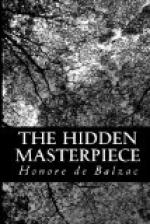“Colors fit to fling out of the window with the man who ground them, —crude, false, revolting! who can paint with them?”
Then he dipped the point of his brush with feverish haste into the various tints, running through the whole scale with more rapidity than the organist of a cathedral runs up the gamut of the “O Filii” at Easter.
Porbus and Poussin stood motionless on either side of the easel, plunged in passionate contemplation.
“See, young man,” said the old man without turning round, “see how with three or four touches and a faint bluish glaze you can make the air circulate round the head of the poor saint, who was suffocating in that thick atmosphere. Look how the drapery now floats, and you see that the breeze lifts it; just now it looked like heavy linen held out by pins. Observe that the satiny lustre I am putting on the bosom gives it the plump suppleness of the flesh of a young girl. See how this tone of mingled reddish-brown and ochre warms up the cold grayness of that large shadow where the blood seemed to stagnate rather than flow. Young man, young man! what I am showing you now no other master in the world can teach you. Mabuse alone knew the secret of giving life to form. Mabuse had but one pupil, and I am he. I never took a pupil, and I am an old man now. You are intelligent enough to guess at what should follow from the little that I shall show you to-day.”
While he was speaking, the extraordinary old man was giving touches here and there to all parts of the picture. Here two strokes of the brush, there one, but each so telling that together they brought out a new painting,—a painting steeped, as it were, in light. He worked with such passionate ardor that the sweat rolled in great drops from his bald brow; and his motions seemed to be jerked out of him with such rapidity and impatience that the young Poussin fancied a demon, encased with the body of this singular being, was working his hands fantastically like those of a puppet without, or even against, the will of their owner. The unnatural brightness of his eyes, the convulsive movements which seemed the result of some mental resistance, gave to this fancy of the youth a semblance of truth which reacted upon his lively imagination. The old man worked on, muttering half to himself, half to his neophyte:—
“Paf! paf! paf! that is how we butter it on, young man. Ah! my little pats, you are right; warm up that icy tone. Come, come!—pon, pon, pon,—” he continued, touching up the spots where he had complained of a lack of life, hiding under layers of color the conflicting methods, and regaining the unity of tone essential to an ardent Egyptian.
“Now see, my little friend, it is only the last touches of the brush that count for anything. Porbus put on a hundred; I have only put on one or two. Nobody will thank us for what is underneath, remember that!”
At last the demon paused; the old man turned to Porbus and Poussin, who stood mute with admiration, and said to them,—




